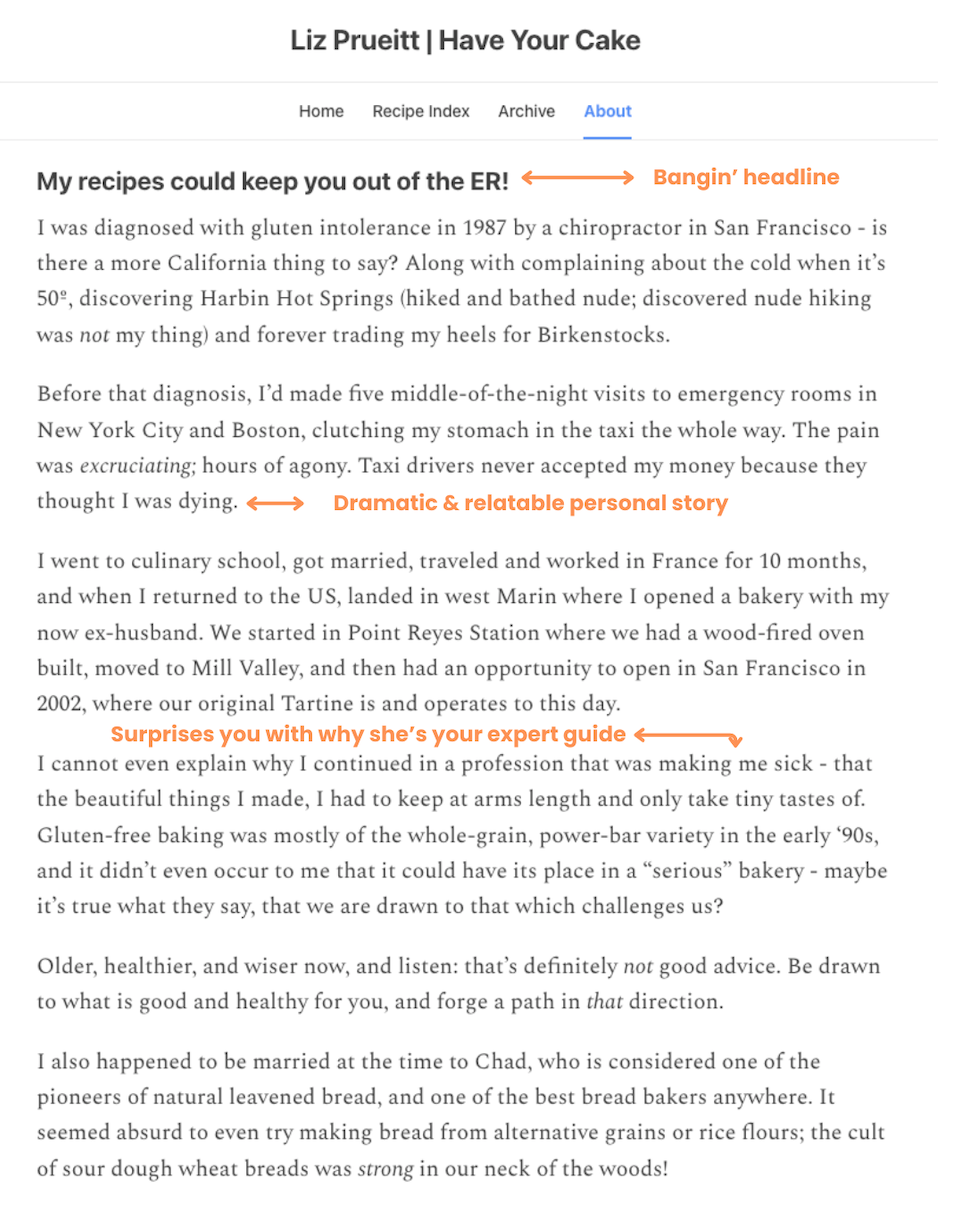Who’s your Substack About page really about?
When I coach a new client during a Set Up and Grow Your Substack session, people always want to know if their About page should be more about themselves, about the newsletter, or a combination of both.
My answer usually surprises them.
It’s about your reader.
The About page is one of the most important sections of your Substack because it’s where new readers decide if it’s the right place for them and if you’re a writer they’ll connect with. (Especially if you plan to offer paid subscriptions.)
TLDR; If you’re not on Substack and you get these lovely emails in your inbox, you may just want to watch the one-minute video above, 3 Things I’d Tell You If We Met at a Party, from my About page. I also want to introduce you to one of my clients,
Liz Prueitt
(co-founder of TartineBakery), and her Substack Have Your Cake, revolves around her sexy gluten-free recipes.
But if you do have a Substack (or a personal website that needs a refresh), the About page Liz wrote while we worked together has some great elements worth stealing and making your own.
In which case… read on.
Your opening is an invitation
Think about it like you’re inviting people to your house for a party. As the host or hostess, you want to make readers feel comfortable from the moment they walk through the door.
And you also want them to blend into the party, feel interested in meeting new people and join in a few conversations. (Or maybe they don’t blend in and realize they’re at the wrong party! That’s good info for them to know too.)
So, kick things off with a clear distillation of your newsletter's main theme or subject.
Make it a concise yet intriguing summary of what your newsletter covers, and be clear about who it’s for and why you care so much about the topic.
It helps readers figure out if they’re at the right party and if you’re a host or hostess who will check in and make sure they’re feeling welcome.
Kirsten Powers
does this in two sentences with her newsletter, Changing the Channel.
“Welcome to the Substack bestseller, Changing the Channel—a newsletter from New York Times bestselling author Kirsten Powers about unlearning societal conditioning, living authentically, and how to actually change your life.
If you feel stuck in some aspect of your life and feel like there must be a better way to live, then you have come to the right place.”
Succinct and smooth.
Then, she paints a vivid picture that visualizes her unique value proposition in the reader's mind.
She’s the hostess at a party where everyone’s there to make some life change. Something all of us can relate to and connect with.
Now, you don’t have to be a NYT bestselling author to communicate your newsletter's value proposition clearly to your readers. (Phew 😅 the pressure’s off on that one!)
But you do need to think through how you’re different from the other 18,000 Substacks out there.
Share a personal story that hits a few different notes
While a strong opening draws your reader in, a relatable personal story can build trust and rapport, making them want to read more.
Imagine walking into a room and overhearing one of the hosts tell a story with people gathered around, hanging on every word.
You can use the right details in a few bite-sized paragraphs to build trust, credibility, and passion for your topic.
Liz Prueitt
of Have Your Cake uses what’s most important in her backstory to establish herself as a relatable and trustworthy guide about gluten-free baking.
Her headline kicks it off with a bang.
My recipes can keep you out of the ER!
By using just the right specific details in her dramatic personal story, she does three things for her readers:
Establishes her credibility and passion
Hooks us with her utterly unique angle
Creates an authentic connection
Now, the stage is set to sprinkle in a few fun personal anecdotes about her creative hobbies, and some surprising facts. So you feel like you’re getting to know Liz beyond the Tartine brand she’s built.
Personal Flourishes and Surprising Tidbits
Between your professional details, infuse a personal flair that shows readers your voice and personality.
Liz does this in such a fun way by sharing glimpses of her quirky, multi-talented self.
You can imagine her serving you gluten-free appetizers, and while you sip your cocktail, she tells you a few unexpected things about herself to keep you entertained.
Spotlight the value in both free and paid tiers
(if you’re offering a paid tier)
Think of it like the hors d'oeuvres are free, but it’s a cash bar.
Include a short, clear overview of the unique benefits of your free and paid tiers. There’s no shame in making all your articles free. (Everyone loves a party with free booze.)
Just let the reader know exactly what to expect.
Liz uses crisp section headers and bulleted lists to make this distinction obvious.
For example:
"Included in paid subscriptions ($5/month or $50/year):
One new gluten-free recipe a week, every Friday at noon
Archive of recipes, including 'Cook My Book,' recipes from my cookbooks
Giveaways and discounts
Once-a-month Guest Chef: GF recipes from former Tartine chefs
Desserts and baking through history discussions
Ability to comment and join community discussions
Included in the free subscription:
One new gluten-free recipe a month
Archive of recipes
Occasional posts from either Desserts and Baking in History or From the Kitchens of Former Tartine Chefs
She showcases what makes the paid experience special by outlining tangible, value-driven benefits like new exclusive recipes, contributor content, discounts, and a growing community.
So treat your readers like you’re inviting them to a party you’re excited about by:
Crafting a gripping hook that invites readers in
Creating a genuine connection with a personal story they can relate to
Highlighting the value of your free and paid content
Including personal flourishes and surprising tidbits about yourself to let your quirks shine
Being bold and experimenting with video to let people put a face to the name and a voice behind the words
Remember, your About page is a chance to make a lasting first impression.
How about some Substack coaching?
If you’ve struggled with writing about yourself, why not send me a note about a discovery call and we chat about how I can help you?




